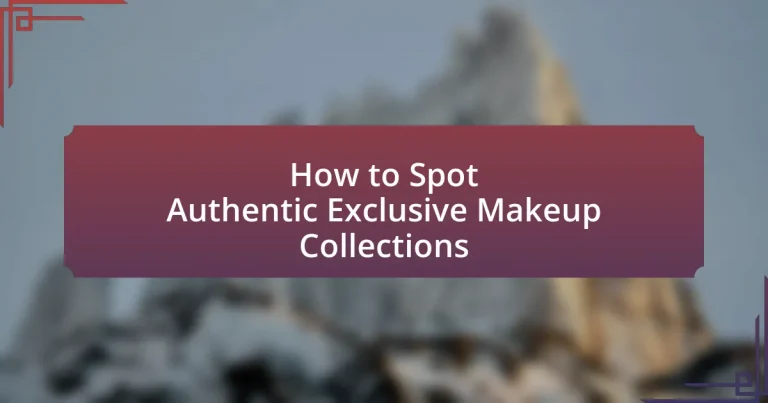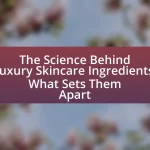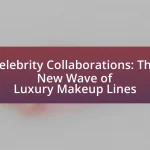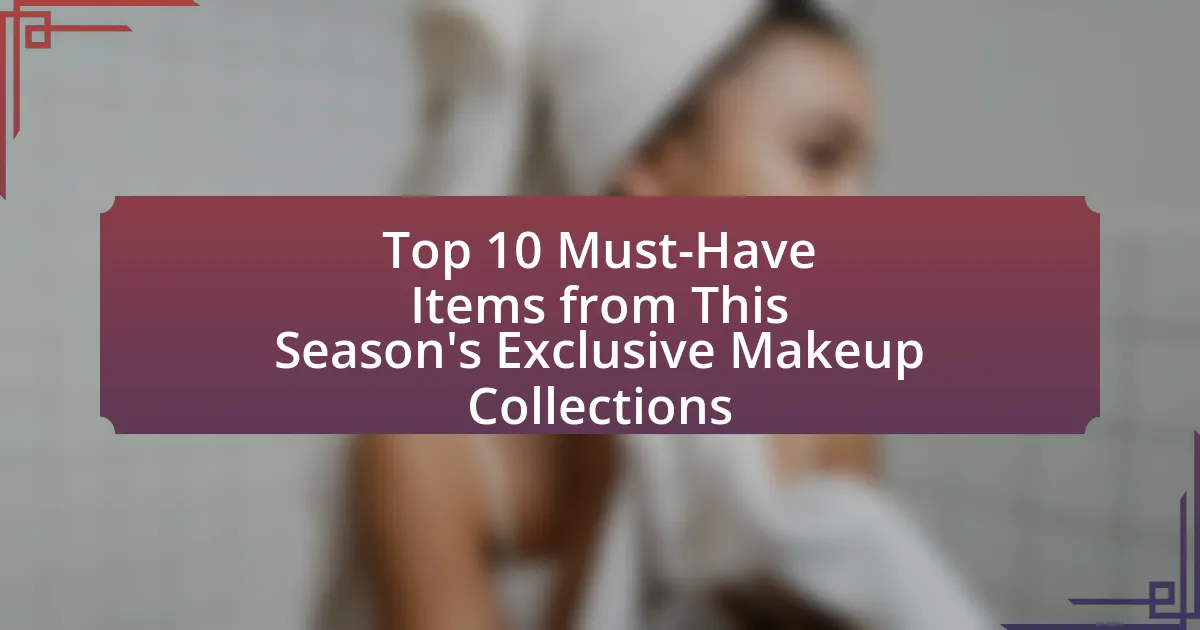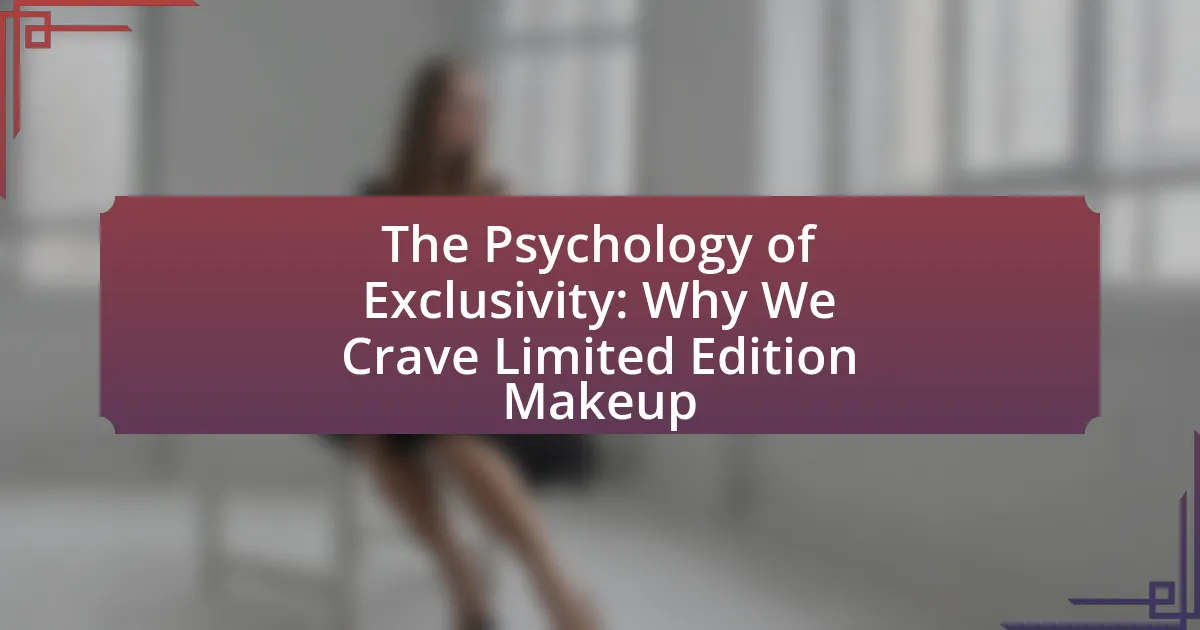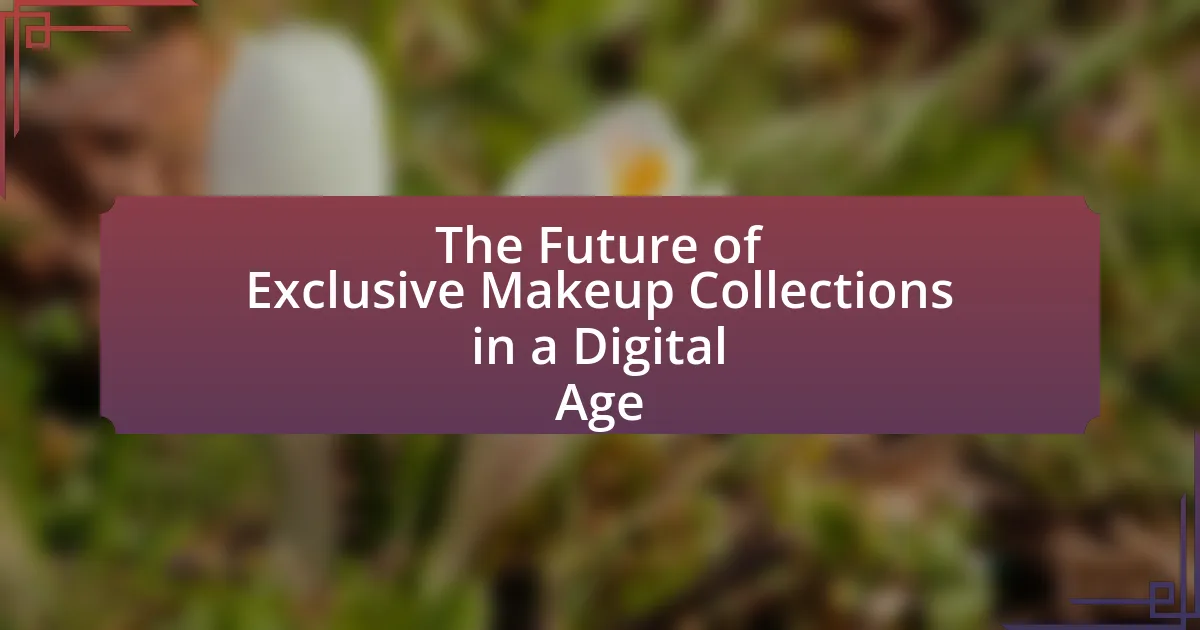Authentic Exclusive Makeup Collections are limited-edition products from cosmetic brands, characterized by unique packaging and exclusive formulations, available only through select retailers or during specific events. This article outlines how to identify these authentic collections by examining packaging quality, brand transparency, and ethical production practices. It also highlights the significance of exclusive collections in the beauty industry, their impact on consumer behavior, and the risks associated with counterfeit products. Additionally, the article provides practical steps for consumers to ensure they purchase genuine items, including tips for verifying authenticity and identifying reputable retailers.
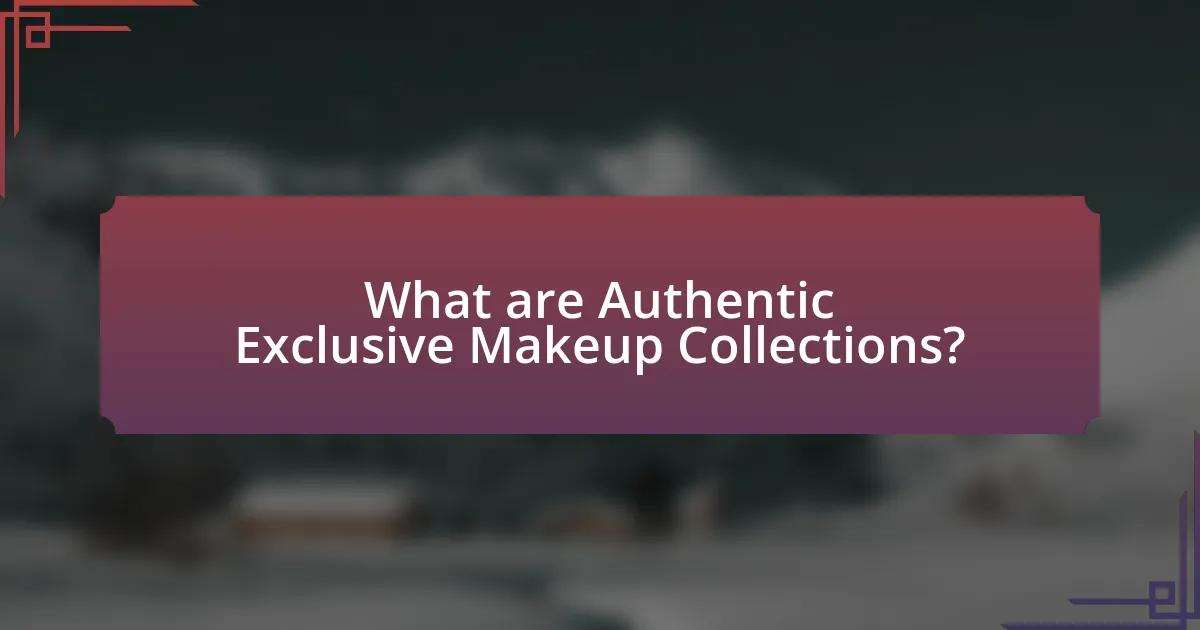
What are Authentic Exclusive Makeup Collections?
Authentic Exclusive Makeup Collections are limited-edition products created by cosmetic brands that are often available only through select retailers or during specific promotional events. These collections typically feature unique packaging, exclusive shades, or formulations that are not part of the brand’s regular offerings, making them highly sought after by consumers. The exclusivity and limited availability contribute to their appeal, often resulting in increased demand and higher resale values.
How can you identify an authentic exclusive makeup collection?
To identify an authentic exclusive makeup collection, examine the packaging, branding, and availability. Authentic collections typically feature high-quality packaging with unique designs, often including limited edition labels or holographic seals. Additionally, reputable brands will provide clear information about the collection’s exclusivity on their official websites or through authorized retailers. For instance, collections released during special events or collaborations are often accompanied by press releases or promotional materials that confirm their authenticity.
What characteristics define authenticity in makeup collections?
Authenticity in makeup collections is defined by several key characteristics: transparency in ingredient sourcing, adherence to ethical production practices, and clear brand identity. Transparency in ingredient sourcing ensures that consumers know the origins and quality of the components used, which is crucial for trust. Ethical production practices, such as cruelty-free testing and sustainable sourcing, reflect a commitment to social responsibility, enhancing the brand’s credibility. A clear brand identity, including consistent branding and messaging, helps consumers recognize and differentiate authentic products from counterfeit ones. These characteristics collectively establish a foundation of trust and integrity in the makeup industry.
How does packaging contribute to the authenticity of makeup collections?
Packaging significantly contributes to the authenticity of makeup collections by serving as a visual and tactile representation of the brand’s identity and quality. High-end brands often utilize unique materials, intricate designs, and specific color schemes that are consistent with their branding, making it easier for consumers to identify genuine products. For instance, luxury makeup brands frequently incorporate embossed logos, holographic elements, or distinctive closures that are difficult to replicate, thus enhancing the perceived value and authenticity of the collection. Additionally, packaging often includes batch codes and serial numbers that can be verified through the brand’s official channels, providing further proof of authenticity.
Why are exclusive makeup collections significant in the beauty industry?
Exclusive makeup collections are significant in the beauty industry because they create a sense of urgency and desirability among consumers. These limited-edition products often feature unique formulations, packaging, or collaborations that differentiate them from regular offerings, driving demand. For instance, brands like MAC and Sephora frequently launch exclusive collections that sell out quickly, demonstrating their ability to generate buzz and increase brand loyalty. This phenomenon is supported by market research indicating that limited availability can enhance perceived value, leading to higher sales and consumer engagement.
What role do exclusive collections play in brand identity?
Exclusive collections significantly enhance brand identity by creating a sense of uniqueness and prestige. These collections differentiate a brand from competitors, fostering a perception of exclusivity that attracts consumers seeking luxury or limited-edition products. For instance, brands like Chanel and Dior leverage exclusive collections to reinforce their heritage and craftsmanship, which solidifies their position in the luxury market. This strategy not only elevates brand perception but also drives consumer loyalty, as customers often associate exclusive offerings with higher quality and status.
How do exclusive collections impact consumer behavior?
Exclusive collections significantly influence consumer behavior by creating a sense of urgency and desirability. When consumers perceive a product as exclusive, they often feel compelled to purchase it quickly to avoid missing out, which can lead to increased sales and brand loyalty. Research indicates that limited availability can enhance perceived value; for instance, a study published in the Journal of Consumer Research found that scarcity increases demand, as consumers associate rarity with higher quality. This psychological trigger drives consumers to prioritize exclusive items over regular offerings, ultimately shaping their purchasing decisions and brand perceptions.
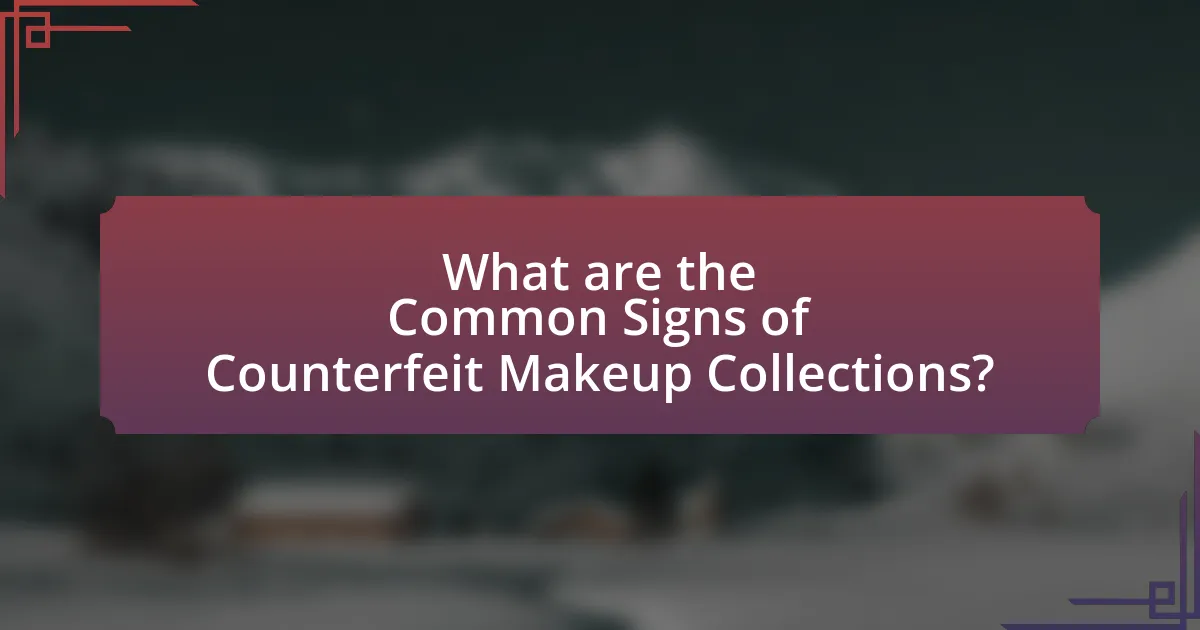
What are the Common Signs of Counterfeit Makeup Collections?
Common signs of counterfeit makeup collections include poor packaging quality, misspelled brand names, and inconsistent product colors. Authentic makeup brands maintain high standards for packaging, including precise logos and high-quality materials. Counterfeit products often have packaging that feels flimsy or has printing errors. Additionally, counterfeit items may have different shades or textures compared to genuine products, as they often use inferior ingredients. According to a study by the International AntiCounterfeiting Coalition, counterfeit cosmetics can contain harmful substances, further highlighting the risks associated with purchasing fake products.
How can you spot counterfeit products in exclusive collections?
To spot counterfeit products in exclusive collections, examine the packaging, labeling, and product details closely. Authentic products typically feature high-quality packaging with precise printing, while counterfeit items often have poor-quality materials and misspellings. Additionally, check for unique identifiers such as serial numbers or holograms, which are commonly used by reputable brands to verify authenticity. Researching the brand’s official website can provide insights into the expected features of genuine products, including color variations and ingredient lists. Counterfeit products may also lack proper certification or documentation, which legitimate brands usually provide.
What are the typical red flags of counterfeit makeup?
Typical red flags of counterfeit makeup include poor packaging quality, misspellings on labels, and unusual color or texture. Authentic makeup brands maintain high standards for packaging, so any signs of flimsy materials or inconsistent branding can indicate a counterfeit product. Additionally, counterfeit items often have spelling errors or incorrect logos, which are not present in genuine products. Furthermore, if the color or texture of the makeup differs significantly from the original, it is likely counterfeit. These discrepancies can be verified by comparing the product with official brand images or descriptions.
How does pricing indicate the authenticity of a makeup collection?
Pricing serves as a key indicator of the authenticity of a makeup collection by reflecting the quality of ingredients, brand reputation, and production standards. Authentic makeup collections typically have higher price points due to the use of premium materials and rigorous quality control processes. For instance, luxury brands often invest in research and development, resulting in innovative formulations that justify their elevated prices. Additionally, counterfeit products are frequently sold at significantly lower prices, which can signal inauthenticity. According to a report by the International AntiCounterfeiting Coalition, counterfeit cosmetics can be priced up to 80% lower than their genuine counterparts, further emphasizing the correlation between pricing and authenticity.
Why is it important to avoid counterfeit makeup collections?
Avoiding counterfeit makeup collections is crucial because these products can contain harmful ingredients that pose health risks to users. Counterfeit makeup often lacks quality control and may include toxic substances such as heavy metals, which can lead to skin irritation, allergic reactions, or long-term health issues. According to a report by the European Commission, counterfeit cosmetics can also contribute to significant economic losses for legitimate brands, undermining consumer trust and safety in the beauty industry. Therefore, steering clear of counterfeit products protects both personal health and the integrity of the market.
What health risks are associated with counterfeit makeup products?
Counterfeit makeup products pose significant health risks, including skin irritation, allergic reactions, and potential long-term health issues due to toxic ingredients. These products often contain harmful substances such as heavy metals, bacteria, and unregulated chemicals that can lead to infections or more severe health complications. For instance, a study published by the American Academy of Dermatology highlighted that counterfeit cosmetics frequently contain high levels of lead and mercury, which are linked to serious health problems, including neurological damage and skin disorders. Therefore, using counterfeit makeup can result in immediate and chronic health risks.
How can counterfeit products affect your beauty routine?
Counterfeit products can severely disrupt your beauty routine by causing skin irritations, allergic reactions, and ineffective results. These fake items often contain harmful ingredients that are not regulated or tested for safety, leading to potential health risks. For instance, a study by the European Commission found that counterfeit cosmetics can contain toxic substances like heavy metals and harmful chemicals, which can damage skin and overall health. Additionally, using counterfeit products can result in wasted money and time, as they may not perform as expected, ultimately undermining the effectiveness of your beauty regimen.
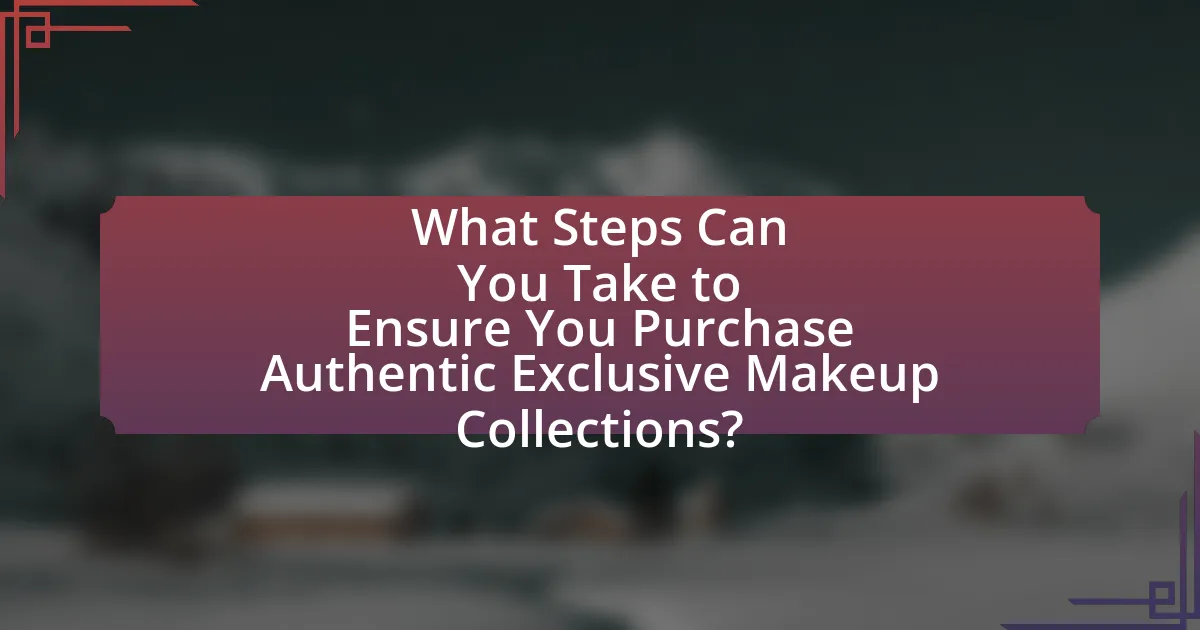
What Steps Can You Take to Ensure You Purchase Authentic Exclusive Makeup Collections?
To ensure you purchase authentic exclusive makeup collections, verify the seller’s credibility by checking for authorized retailers or official brand websites. Authentic brands often list their authorized sellers, and purchasing from these sources minimizes the risk of counterfeit products. Additionally, examine product packaging for quality indicators such as holograms, batch codes, and expiration dates, as genuine products typically have high-quality packaging and clear labeling. Research customer reviews and ratings to gauge the seller’s reputation, as established sellers usually have positive feedback from previous buyers. Lastly, be cautious of prices that seem too good to be true, as significant discounts on exclusive collections often indicate potential fakes.
How can you verify the authenticity of a makeup collection before purchase?
To verify the authenticity of a makeup collection before purchase, examine the packaging for signs of quality, such as consistent branding, proper labeling, and secure seals. Authentic products typically feature high-quality materials and precise printing, while counterfeit items often have poor craftsmanship and misspellings. Additionally, check for batch codes or expiration dates, as legitimate brands provide this information for consumer safety. Research the retailer’s reputation and ensure they are an authorized seller, as purchasing from reputable sources reduces the risk of acquiring counterfeit products.
What resources are available for checking product authenticity?
To check product authenticity, consumers can utilize several resources including official brand websites, authentication apps, and third-party verification services. Official brand websites often provide detailed information on product codes, packaging, and authorized retailers, which can help verify if a product is genuine. Authentication apps, such as Verify, allow users to scan barcodes or QR codes to confirm authenticity. Third-party verification services, like Authenticate First, offer expert analysis and certification of products, ensuring they are not counterfeit. These resources collectively enhance the ability to distinguish authentic products from fakes in the makeup industry.
How can you utilize social media to confirm authenticity?
You can utilize social media to confirm authenticity by analyzing user-generated content, reviews, and official brand communications. User-generated content, such as photos and testimonials, often provides real-life evidence of product usage and satisfaction, which can indicate authenticity. Additionally, checking for verified accounts and official announcements from brands on platforms like Instagram and Twitter helps ensure that the information is credible. For instance, brands often share exclusive product launches and collaborations directly on their social media, allowing consumers to cross-reference these announcements with their purchases. This method is supported by a 2021 study from the Journal of Marketing Research, which found that 70% of consumers trust peer reviews on social media as much as personal recommendations, highlighting the importance of social media in verifying product authenticity.
What are the best practices for buying exclusive makeup collections?
The best practices for buying exclusive makeup collections include researching the brand’s authenticity, purchasing from reputable retailers, and verifying product details. Researching the brand ensures that you understand its history and reputation, which helps in identifying genuine products. Purchasing from reputable retailers, such as official brand websites or authorized stores, minimizes the risk of counterfeit items. Verifying product details, including packaging, ingredient lists, and batch numbers, can further confirm authenticity, as many exclusive collections have unique identifiers or limited edition markings. These practices are essential to ensure that consumers receive high-quality, authentic products.
How can you identify reputable retailers for exclusive makeup collections?
To identify reputable retailers for exclusive makeup collections, research the retailer’s history, customer reviews, and brand partnerships. Retailers with a long-standing reputation in the beauty industry, such as Sephora or Ulta, often carry exclusive collections and have established trust with consumers. Additionally, checking for official brand collaborations can confirm authenticity; for instance, brands like Fenty Beauty or Pat McGrath Labs typically sell their exclusive collections through authorized retailers. Furthermore, look for retailers that offer secure payment options and clear return policies, as these factors indicate a commitment to customer satisfaction and product integrity.
What tips should you follow when shopping online for exclusive makeup?
When shopping online for exclusive makeup, prioritize purchasing from reputable retailers or official brand websites to ensure authenticity. Reputable retailers often provide detailed product descriptions, customer reviews, and return policies that enhance trust. Additionally, check for secure payment options and look for certifications or seals of authenticity on the website. Researching the brand’s official social media channels can also provide insights into their legitimate offerings and promotions. According to a 2021 survey by Statista, 79% of consumers prefer to buy from brands they trust, highlighting the importance of sourcing from credible platforms.
What are the common mistakes to avoid when purchasing exclusive makeup collections?
Common mistakes to avoid when purchasing exclusive makeup collections include failing to verify authenticity, neglecting to research the brand’s reputation, and overlooking product expiration dates. Verifying authenticity is crucial, as counterfeit products can be prevalent in exclusive collections; for instance, a study by the Cosmetic Industry Association found that 20% of luxury beauty products sold online are counterfeit. Researching the brand’s reputation helps ensure quality and customer satisfaction; brands with a history of positive reviews are more likely to offer genuine products. Lastly, overlooking expiration dates can lead to purchasing items that may not be safe or effective, as many makeup products have a limited shelf life.
How can impulse buying lead to purchasing counterfeit products?
Impulse buying can lead to purchasing counterfeit products because consumers often make quick decisions without thorough research or consideration of authenticity. This behavior is driven by emotional triggers, such as excitement or urgency, which can overshadow the need for caution. For instance, a study published in the Journal of Consumer Research found that impulsive shoppers are more likely to overlook product details, increasing the risk of buying fake items, especially in high-demand markets like exclusive makeup collections. Consequently, the lack of due diligence during impulse purchases can result in acquiring counterfeit products that mimic genuine brands.
What should you consider before making a purchase decision?
Before making a purchase decision regarding exclusive makeup collections, consider the authenticity of the product. Authenticity can be verified through factors such as the brand’s official website, authorized retailers, and product packaging details. Research indicates that counterfeit cosmetics can contain harmful ingredients, posing health risks; for instance, a study by the American Academy of Dermatology highlights that unregulated products may lead to skin irritations or allergic reactions. Therefore, ensuring the product’s authenticity is crucial for both safety and quality.
